QuestionI got 2 guinea pigs a couple of weeks ago one is male one is female. i recently discovered that the female has got bigger and more round and everytime i pick her up she squeals alot louder than usual. I really don't know if she is pregnant or not and if she is how do I take care of her and make sure she is still healthy? And when ever she does have babies how do I take care of them? I need help!!! So bad!!
Answer
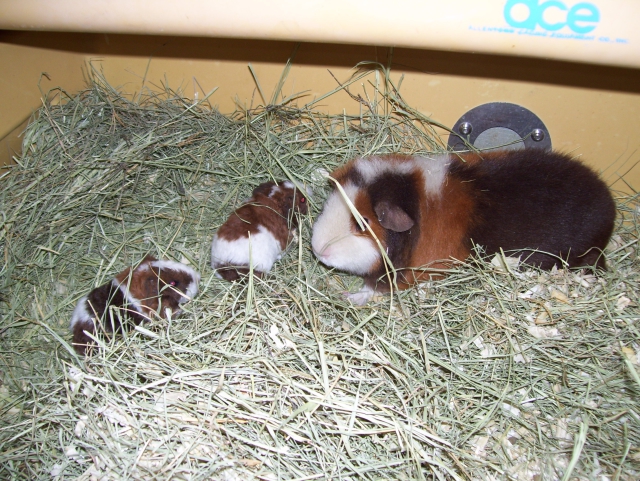 Teddy babies two days
Teddy babies two days
Congratulations Kellie! You're going to be a "grandma". But don't fret, the little mamma will know exactly what to do. All you need to do is keep your camera ready.
The gestation for cavies is 10 weeks. Just generally speaking when you feel the babies move she is about two weeks away from delivery. If she's been with this male you can bet she's pregnant. However, it may not be from him. The fact that she's getting rounder is indication that she's probably about six weeks along.
She doesn't require anything special during pregnancy. A fresh supply of food and water is all she really needs. If the boar is with her, take him out. He will not harm the babies in any way but she will come into heat within hours of delivery and he'll breed her back again.
Cavy dads are excellent fathers. They will cuddle and love the babies and allow them to crawl all over them. The problem is that baby sows can come into their first heat as young as 2 weeks old and they CAN be bred at that time. So it's best to leave dad out of the household during that time.
The babies are born looking exactly like their parents, fully furred, mouthful of teeth, eyes wide open and ready to run. They instinctively know to stay right where they were born until mom says its okay to move.
Mom may appear to ignore the babies for a couple of hours, but she knows what she's doing. She will not nurse the babies until she's finished delivering and has cleaned out her uterus of all the placentas, etc. So don't interfere with her. I've seen them go many hours without nursing the pups, but they always know when the right time comes.
Don't be upset or startled if there is a stillborn pup. It's very common to have losses in any litter. Once the sow starts labor the babies come rather quickly. She will deliver them about 15 to 20 minutes apart.
Once the babies are dry you can pick them up. She won't object at all. Be extremely cautious, make sure you have your hands around those babies and have a good grip. They can leap out of your hand at amazing speed. So to avoid any accidents just make sure you are in control.
Most litters average about three babies, sometimes more. And a litter of one or two is just as common. The more babies she has the smaller each will be. If she has only one or two they will be surprisingly large. Mom has only two nipples but will manage to keep everyone fed.
Occasionally there is a runt born that is weak and unable to nurse. It's our human instinct to try to save the sickly babies, but Nature has provided mom with the ability to know when something is wrong with one of her babies. She will not try to nurse that baby or give it extra attention. In the wild there is no time to spend with a sickly or weak baby, so the mom instinctively allows the poor thing to pass. Doing otherwise may put the healthy babies at risk of predators making them easy targets because they slowed up for the weak babies.
Although it sounds tough and mean not to help it out you have to resist the urge to intervene. I've found over the many years I've raised cavies that even if you manage to hand feed a runt they always fail to thrive as there is more wrong inside than just a small baby. The wild mothers know not to endanger the safety of the healthy babies in order to save a sick one. This is why animals in the wild are always strong, because only the strongest and best survive.
If a herd is to be able to survive it has to be that way. Allowing sick ones to grow up and breed is not in the best interest of the animals. That's why animals have that built in instinct that tells them what to do. So don't feel as though you should have or could have saved a baby that is too weak or small to get in the crowd and eat. There's usually something more wrong than just size. They often have an inability to digest their food and they have little or no immunity.
Human nature makes us do anything and everything possible to keep a sickly baby alive. Puppies and kittens who do manage to survive long enough to be weaned are never as strong as their siblings. Same goes with guinea pigs.
Be careful lifting the sow at this point in her pregnancy. If you need to pick her up make sure your hands are underneath her to support her growing belly. Baby cavies are born roughly 4 oz in size. That's incredibly large when you consider that the mother may only weigh 30 oz. If she has four babies she's given birth to nearly 1/2 of her own weight. That can be compared to a 120 pound woman giving birth to a 60 pound baby!
Her belly may grow so large you wonder how she can move around. Again, Nature has supplied her with all the tools to take care of birthing and caring for her litter.
So keep your camera ready because one morning you may wake up to six or eight extra eyes staring up at you. They're remarkably cute and incredibly amazing little creatures. You're in for a real treat. Please send pictures when the babies come. And best of luck to you and your new family.


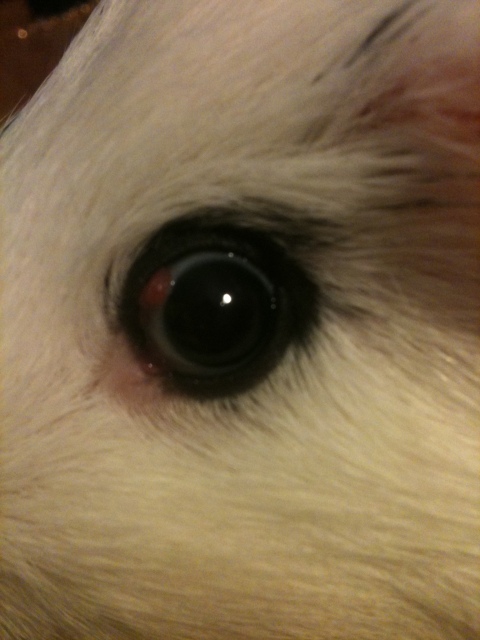 Guinea Pig Eye Problem
Question
Wheekys Eye
I have a 2 yr old male guin
Guinea Pig Eye Problem
Question
Wheekys Eye
I have a 2 yr old male guin
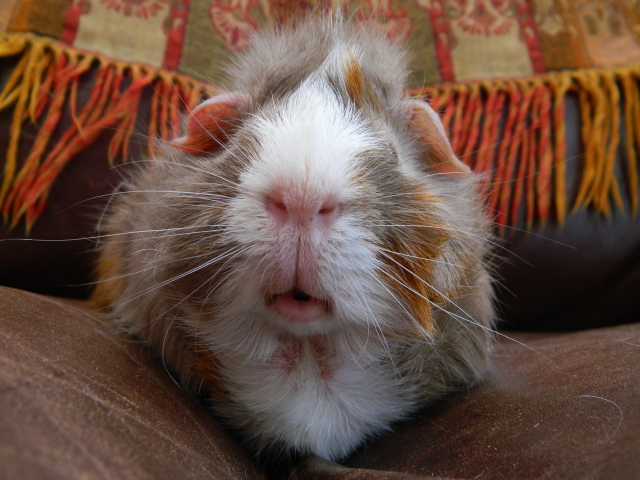 Guinea Pig Skin
Question
This is what it looks
Rory my Abyssini
Guinea Pig Skin
Question
This is what it looks
Rory my Abyssini
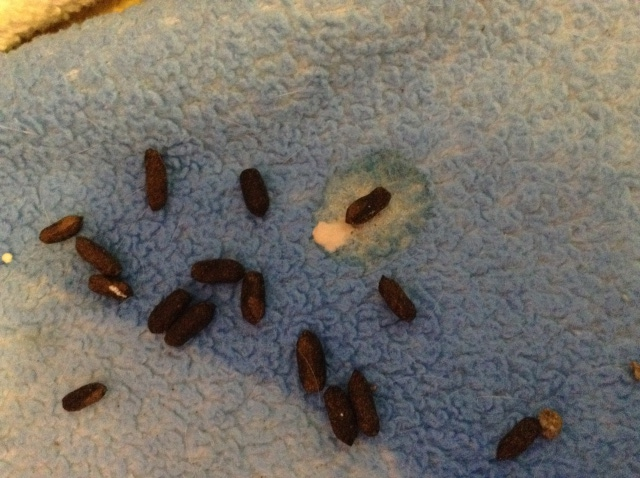 Gingers pee and poop
Question
Gingers pee and poo
my one guinea pig O
Gingers pee and poop
Question
Gingers pee and poo
my one guinea pig O
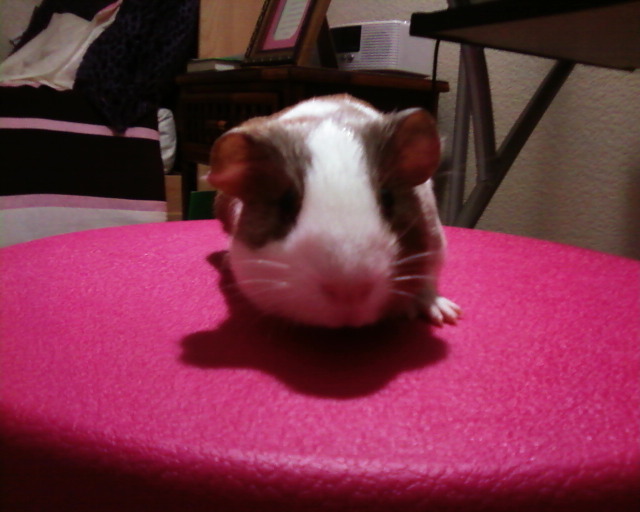 Crazy piggy
Questionpicture of Coco
QUESTION: Hello, well I
Crazy piggy
Questionpicture of Coco
QUESTION: Hello, well I
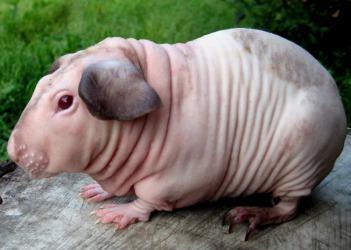 Skinny pig
QuestionQUESTION: I am troubled that an expert does not
Skinny pig
QuestionQUESTION: I am troubled that an expert does not